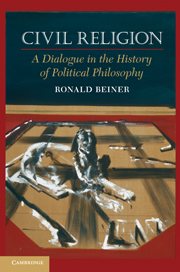Book contents
- Frontmatter
- Contents
- Preface and Acknowledgments
- Introduction
- Part I Machiavelli, Hobbes, Rousseau
- Part II Responses to (and Partial Incorporations of) Civil Religion within the Liberal Tradition
- 9 Baruch Spinoza
- 10 Philosophy and Piety
- 11 Spinoza's Interpretation of the Commonwealth of the Hebrews, and Why Civil Religion Is a Continuing Presence in His Version of Liberalism
- 12 John Locke
- 13 “The Gods of the Philosophers” I
- 14 Bayle's Republic of Atheists
- 15 Montesquieu's Pluralized Civil Religion
- 16 The Straussian Rejection of the Enlightenment as Applied to Bayle and Montesquieu
- 17 “The Gods of the Philosophers” II
- 18 Hume as a Successor to Bayle
- 19 Adam Smith's Sequel to Hume (and Hobbes)
- 20 Christianity as a Civil Religion
- 21 John Stuart Mill's Project to Turn Atheism into a Religion
- 22 Mill's Critics
- 23 John Rawls's Genealogy of Liberalism
- 24 Prosaic Liberalism
- Part III Theocratic Responses to Liberalism
- Part IV Postmodern “Theism”
- Conclusion
- Index
- References
16 - The Straussian Rejection of the Enlightenment as Applied to Bayle and Montesquieu
Published online by Cambridge University Press: 05 June 2012
- Frontmatter
- Contents
- Preface and Acknowledgments
- Introduction
- Part I Machiavelli, Hobbes, Rousseau
- Part II Responses to (and Partial Incorporations of) Civil Religion within the Liberal Tradition
- 9 Baruch Spinoza
- 10 Philosophy and Piety
- 11 Spinoza's Interpretation of the Commonwealth of the Hebrews, and Why Civil Religion Is a Continuing Presence in His Version of Liberalism
- 12 John Locke
- 13 “The Gods of the Philosophers” I
- 14 Bayle's Republic of Atheists
- 15 Montesquieu's Pluralized Civil Religion
- 16 The Straussian Rejection of the Enlightenment as Applied to Bayle and Montesquieu
- 17 “The Gods of the Philosophers” II
- 18 Hume as a Successor to Bayle
- 19 Adam Smith's Sequel to Hume (and Hobbes)
- 20 Christianity as a Civil Religion
- 21 John Stuart Mill's Project to Turn Atheism into a Religion
- 22 Mill's Critics
- 23 John Rawls's Genealogy of Liberalism
- 24 Prosaic Liberalism
- Part III Theocratic Responses to Liberalism
- Part IV Postmodern “Theism”
- Conclusion
- Index
- References
Summary
[T]he libertin érudit stance has a natural tendency to undo itself, to speak the truth which it is always hinting at and denying.
– Abraham AndersonThere is no secret that is wholly secret.
– Anne NortonIn The Idea of Enlightenment, Robert C. Bartlett offers an interesting account of Montesquieu's “quarrel” with Bayle, the purpose of which is to show that Bayle and Montesquieu really agree on the end (to defang religion) and differ only on the question of means, or on strategies to realize the goal. Bartlett's larger thesis – that modern rationalism, as exemplified by Bayle and Montesquieu, is doomed to ultimate failure – is very puzzling though, for the domestication of religion and humbling of theocratic politics sought by Bayle and Montesquieu have largely come to pass in modern societies. Bartlett's adverse judgment on modern rationalism is founded on a complicated Straussian argument about modern philosophy as a betrayal of the existential supremacy of philosophy itself. This too is very puzzling, for the Enlightenment was a cultural battle between philosophy and religion, the outcome of which was an unconditional triumph for philosophy.
How can philosophy not be vindicated by winning a cultural victory of such proportions? I suppose it is possible to think that it was the actual victory of philosophy over religious orthodoxy that diminished philosophy as a comprehensive engagement with the most important alternatives. (That is, ancient political philosophy is existentially superior because it still grapples with civic piety as a genuine alternative, whereas modern political philosophy tends to operate on a less grand plane precisely to the extent that religion is assumed to have been defeated as a rival basis for human self-understanding.) Another possibility is the view that philosophy was diminished insofar as its victory over orthodoxy “piggybacked” on natural science. In any case, it seems paradoxical to interpret what was historically a colossal cultural victory for philosophy as a defeat for philosophy.
- Type
- Chapter
- Information
- Civil ReligionA Dialogue in the History of Political Philosophy, pp. 199 - 204Publisher: Cambridge University PressPrint publication year: 2010



